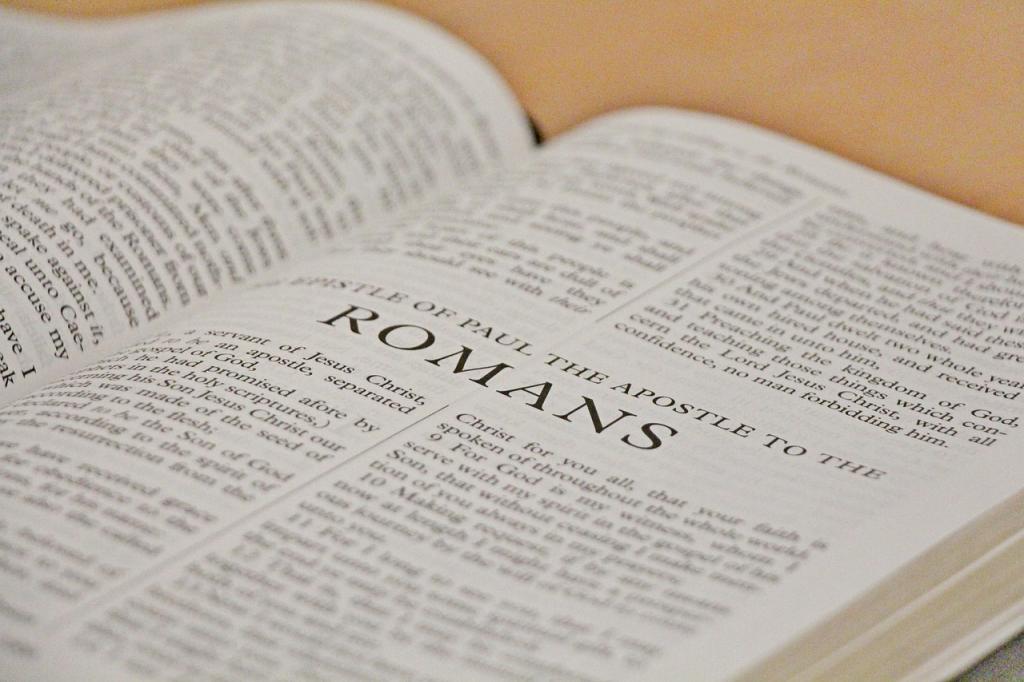As I currently do research on Paul’s epistle to the Romans, I would like to share what I consider the 12 best commentaries on this letter. As a New Testament professor, not a pastor or layperson, I probably have a different perspective than some. No doubt, my ratings are biased because of it. If you want a commentary that you can read cover to cover, or a commentary that compiles sermons, my list may not be of much help to you. But if you are wanting a reference tool that will address a multitude of questions you might have on any given verse in Romans, this list will be beneficial to know.
I limit myself to a selection of 12 commentaries in the English language that have been published during the last 50 years or so. My choices would be different had I included other eras and languages, as suggested at the end of this article.

The Top 12 Romans Commentaries
- C. K. Barrett, The Epistle to the Romans (rev. ed.); Black’s New Testament Commentary (A. C. Black/Hendrickson Publishers)
Barrett was an excellent biblical interpreter from the Methodist tradition, and his commentary on Romans reflects his typical sensitivity to exegesis and grammatical points. This frequently cited work covers Romans verse by verse with a fresh translation and without being wordy. The commentary totals less than 300 pages. But having read his stellar commentaries on 1–2 Corinthians and John’s Gospel, I must confess that this commentary is not quite as thorough in comparison.
- Dmitri Royster, St. Paul’s Epistle to the Romans (St. Vladimir’s Seminary Press)
This commentary is from the Archbishop of Dallas and the South. It provides a recent interpretation of Romans from the Eastern Orthodox Church, and hence its inclusion on this list. The work covers Romans essentially verse by verse. It is inundated with references to early church fathers such as John Chrysostom, John of Damascus, Gregory of Nazianzus, and others, though a setback is that it does not engage with other contemporary scholars. Paul Nadim Tarazi, The Chrysostom Bible: Romans, an Orthodox professor, is a worthy alternative commentary in this tradition. It provides plenty of his own interesting insights, though he uses a passage by passage rather than verse by verse approach.
- Brendan Byrne, Romans; Sacra Pagina (Michael Glazier Book–The Liturgical Press)
Byrne, S. J., is a Roman Catholic scholar and Professor Emeritus of the University of Divinity in Melbourne, Australia. His commentary is clear, concise, and both technical yet user-friendly. It covers Romans thoroughly and verse and verse, though some portions of the commentary I consider more valuable than others. His superb handling of Romans 8 is one of the stand outs that everyone will want to consult.
- N. T. Wright, “The Letter to the Romans” in The New Interpreter’s Bible Commentary (Abingdon Press), Volume IX: 319-664.
This is Wright’s most intense commentary on Romans. As to be expected, it reflects classic Wright theology with plenty of insights. Whether you end up agreeing with his interpretation or not, there’s never a dull moment. Since this commentary came out in the early 2000’s, Wright has since that time updated some of his interpretations of passages in this letter. For his update on Romans 9–11, for instance, you will want to consult his more recent tome, Paul and the Faithfulness of God.
- Ernst Käsemann, Commentary on Romans (Eerdmans).
This work was translated from German by Geoffrey Bromiley. Among Romans commentaries that have come out within the last several decades it is arguably the most often cited work internationally. Written by one of the most influential biblical scholars of the last century, the wealth of information you will receive from this commentary make up for its strange format, awkward writing style, and sometimes even strange interpretations! Be prepared to read certain sentences a few times before you can fully digest them.
- Frank Thielman, Romans; Exegetical Commentary on the New Testament (Zondervan)
This is the newest member on the list. Thielman provides a good balance between exegetical structuring, comments, cross references, and engagement with other scholars. He approaches the text with a fresh interpretation on many verses rather than simply reiterating what other scholars say. He also provides a good balance when referencing ancient sources, not only interacting with Second Temple Jewish literature but also Greco-Roman.
- Joseph A. Fitzmyer, S. J., Romans; The Anchor Bible (Doubleday/ Yale University Press)
In my opinion, this is the second best “go to” commentary after Cranfield’s (see below) that is quickly accessible and provides no-nonsense standard interpretations on every verse in Romans. For the non-informed Greek reader, this would be the first commentary on the list that you would want to consult. Some of the commentaries from the Anchor Bible are hard to follow format-wise, but this one is a refreshingly easy. The verse-by-verse “Notes” section far exceeds the content of the “Comment” section, which assists in its clear and concise style. Each pericope also includes a bibliography, though the sources are all prior to the year 2000.
- Thomas R. Schreiner, Romans; Baker Exegetical Commentary on the New Testament, 2nd edition (Baker Academic)
Drop the first edition and buy the second edition that just came out in 2018. The revised edition really makes this commentary stand out now since it engages with many up-to-date scholarly works on Romans, while it still engages with the older ones. The newer edition is also thorough and well written. Schreiner’s conservative Reformed perspective will win over the hearts of certain readers I’m sure, while at the same time it will repel others. For me, most of his chapters are quite informative regardless of whether I agree with him or not. His interpretation of Romans 9, however, is irritating and too polemical—he insists on the double-predestination of individuals. (A formidable counter voice here are the monograph volumes by Brian J. Abasciano, Paul’s Use of the Old Testament in Romans 9:1–9, and Paul’s Use of the Old Testament in Romans 9:10–18 [Library of New Testament Studies; T. & T. Clark]. A third volume that covers 9:19-24 will be coming out fairly soon.)
- Robert Jewett, Romans: A Commentary on the Book of Romans. Hermeneia (Fortress Press)
Jewett’s work seems like the equivalent of John’s Gospel in comparison with the other three Gospels—it is unlike anything that came before it! His emphasis on honor and shame, stress on atypical rhetorical features, and employment of Greco-Roman sources make this commentary quite unique. In almost every verse, Jewett poses a different way of reading the text than what one might consider to be standard. Even his footnoted sources are frequently not the typical ones cited in other commentaries. I have received many insights from this work, and also I have many disagreements with it. Let everyone be persuaded in their own minds after consulting it.
- C. E. B. Cranfield, Romans 1–8; Romans 9–16; International Critical Commentary (T. & T. Clark)
This two-volume set by the late Cranfield, former professor at Durham University, I still consider to be the best go-to commentary for concise answers with sensible interpretations. But be forewarned—when it comes to biblical languages, it is not user-friendly. Although there is an English translation of Romans in these volumes, the verse-by-verse section uses the Greek version in bold letters without translation. Still, even a person who is not familiar with Greek will benefit from its many incisive comments. Cranfield’s work replaced another great ICC commentary on Romans by William Sanday and Arthur C. Headlam. The only reason Cranfield’s book is not #1 on my list is due to its age—it first came out in the late 1970’s, and quite a lot has happened in Pauline scholarship since then. ICC may soon want to replace Cranfield with an updated successor, but this will definitely be one tough act to follow!
- James D. G. Dunn, Romans 1–8; Romans 9–16; Word Biblical Commentary (Word Books)
This is another excellent two-volume set by another professor from Durham. It is inundated with tons of cross-references to Jewish Scripture and Second Temple literature. Dunn’s work reflects the New Perspective on Paul (click on this link for my earlier article on this), but even nay-sayers of this perspective will find his Romans commentary to be fair, balanced, and very perceptive. I read the volumes cover to cover when travelling to Durham, England after being accepted for the Ph.D. program under Dunn’s supervision. But even now when I read it, more than 25 years later, I still gain new insights.
- Douglas J. Moo, The Letter to the Romans. The New International Commentary on the New Testament. Second Edition (Eerdmans)
The second edition of this work recently came out in 2018. If counting the first edition, this is actually Moo’s third major commentary on Romans (he wrote another one for the NIV Application Commentary series). The second edition is a virtual compendium of updated Romans research since Moo habitually engages with many secondary sources. I don’t always agree with Moo; in fact many times I find myself disagreeing with him.* But it really doesn’t matter because on almost every interpretative issue, he will present the gamut of scholarly opinions before stating which position he favors. That is one of the best perks about this book. The work is basically an English equivalent to the German commentaries of Wolter and Schnabel (see below). It weighs in at 1,027 pages.
* * *
Of course, much more could be said if I were recommending older Romans commentaries. Among the important ones include commentaries by John Murray, C. H. Dodd, Karl Barth (unless you are a die-hard Barthian, the shorter version will suffice), William Sanday and Arthur C. Headlam, J. P. Lange, Thomas Robinson, H. A. W. Meyer, Frederic Louis Godet, August Tholuck, Charles Hodge, Johann Albrecht Bengel, John Wesley, John Calvin, Martin Luther, Thomas Aquinas, Peter Abelard, Augustine, Pelagius, Ambrosiaster, John Chrysostom, and Origen. Anthologies on Romans include commentators from the Reformation era, Reformation Commentary on Scripture (Gwenfair Walters Adams; IVP Academic), from the Medieval era, The Glossa Ordinaria on Romans (Michael Scott Woodward; Teams Commentary series; Medieval Institute Publications), and from the early church era, Ancient Christian Commentary on Scripture (Gerald Bray; IVP Academic). The second edition of the latter is exceptionally well done.
Had I included commentaries in other languages, Michael Wolter’s recent two-volume commentary in German, Der Brief an Die Römer (Evangelisch-Katholischer Kommentar zum Neuen Testament), and Eckhard Schnabel’s 1,740 page Der Brief des Paulus an die Römer (HistorischTheologische Auslegung), would top the list. Other good Romans commentaries in German in the last several decades include those from the authors Ulrich Wilckens, Otto Michel (1978 ed.), Klaus Haacker (2nd ed.), Eduard Lohse, and Dieter Zeller. In French, I would recommend Simon Légasse, Alain Gignac, and the older but still very useful Marie-Joseph Lagrange. In Italian, I would recommend Romano Penna. No doubt, there are other good ones in different languages, but I have not consulted them.
Note
* In all fairness Moo also disagrees with my interpretations, too, based on some of his footnotes to my Jews, Gentiles, and the Opponents of Paul. Apostasy in the New Testament Communities, vol. 2 (Cascade).
Image: King James Version kjv via pixabay.com













